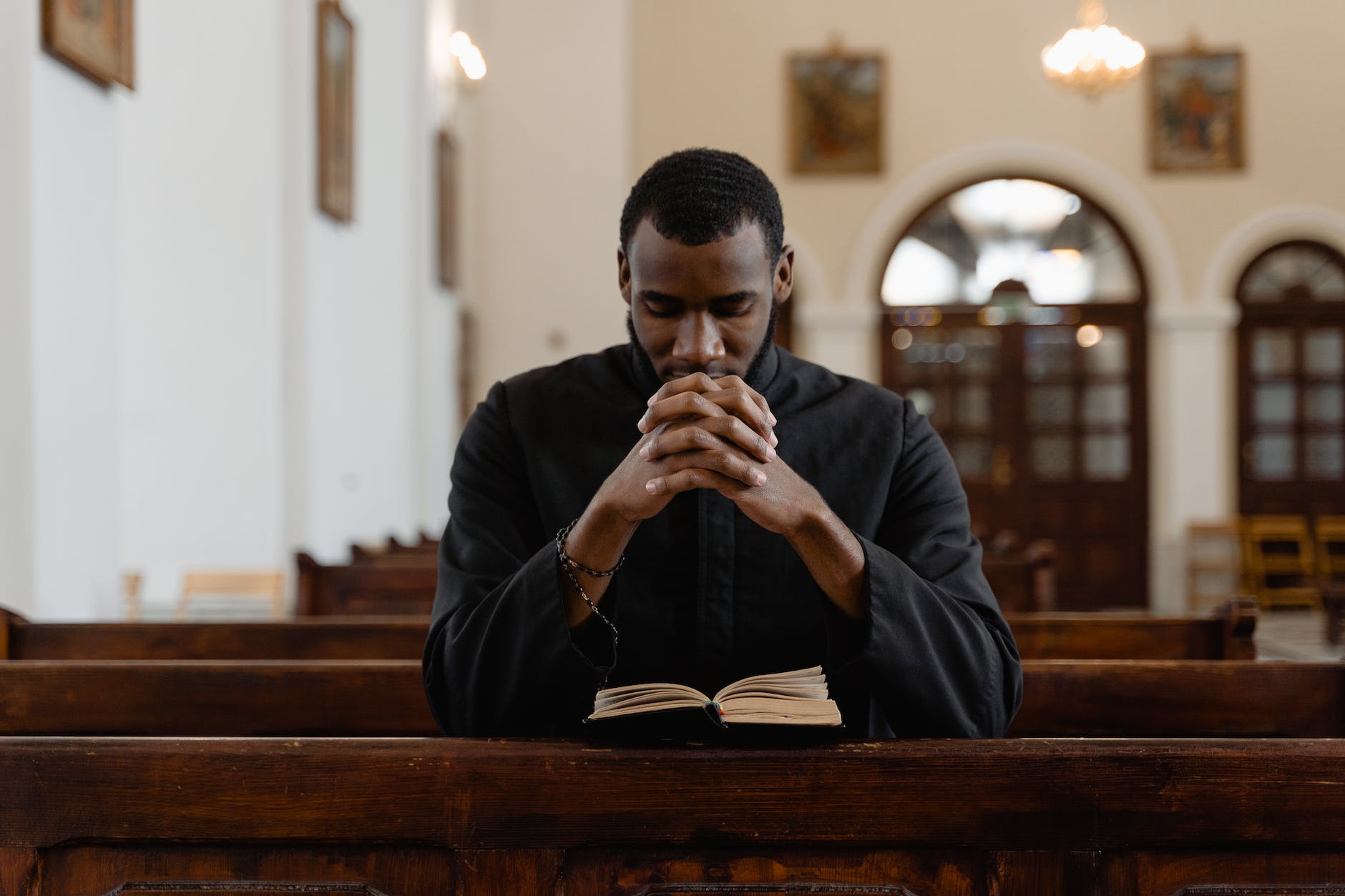i. Introduction
Welcome, dear reader! If you’ve clicked on this post, chances are you’re standing at the foot of a mountain, peering up at the path that winds its way to the peak. That mountain? It’s your spiritual journey. The path? It’s the one you’re about to embark on, guided by faith, wisdom, and a dash of Soulminate Spice. So, lace up your hiking boots, fill your water bottle with curiosity, and let’s get started!
Your Spiritual Journey in Christ: A Beginner’s Guide to Faith-Infused Personal Growth is not just another self-help guide. It’s a roadmap to a life enriched by faith, a compass pointing towards personal growth, and a pair of binoculars to help you see the bigger picture. It’s a journey of self-discovery, spiritual exploration, and deepening your relationship with God.
Why is this important? Well, imagine trying to navigate through a dense forest without a map, compass, or any sense of direction. Sounds challenging, right? That’s what personal development can feel like without the guiding light of spirituality.
In the words of the Apostle Paul, “For we walk by faith, not by sight.” – 2 Corinthians 5:7 (ESV). Our spiritual journey is not just about what we can see or touch; it’s about believing in the unseen, trusting in God’s plan, and growing in faith.
In the following sections, we’ll delve into the essence of faith, the role of Christ in your spiritual journey, practical steps to deepen your faith, and much more. So, whether you’re a spiritual newbie or a seasoned pilgrim, this guide is for you.
Ready to take the first step on your spiritual journey? Let’s dive in!
II. Understanding Faith

What is Faith, Anyway?
If you’ve ever tried to catch a fish with your bare hands, you’ll know it’s a slippery task. Defining faith can feel a bit like that—elusive, yet tangible; complex, yet beautifully simple. In the Christian context, faith is more than just a belief; it’s a profound trust in God and His promises. It’s the confident assurance in what we hope for and the conviction about things we cannot see (Hebrews 11:1, ESV).
Faith is like a seed planted in the soil of our hearts. It might start small, but with the right nurturing—prayer, scripture, community—it can grow into a mighty tree, deeply rooted and reaching towards the heavens.
Why Faith Matters in Christianity
Faith in Christianity is like the North Star in a sailor’s sky—a guiding light, a fixed point of reference, and a beacon of hope in the darkest nights. It’s the cornerstone of our relationship with God, the foundation upon which we build our understanding of His word, and the fuel that drives our spiritual growth.
Without faith, we’re like a ship adrift at sea, tossed by the waves of doubt and carried by the currents of worldly concerns. But with faith, we’re anchored in the safe harbor of God’s love, equipped to weather any storm, and chart a course towards spiritual growth.
In the words of the Apostle Paul, “So faith comes from hearing, and hearing through the word of Christ.” – Romans 10:17 (ESV). Our faith grows as we engage with scripture, listen to God’s word, and apply its teachings in our daily lives.
So, why does faith matter in Christianity? Because it’s our lifeline to God, our compass on the spiritual journey, and the heart of our personal growth. It’s not just about believing in God; it’s about trusting Him, walking with Him, and growing with Him every step of the way.
In the next section, we’ll explore the role of Christ in your spiritual journey. But for now, take a moment to reflect on your understanding of faith. Is it a tiny seed, a budding sapling, or a mighty tree? Wherever you are on your journey, remember: every giant tree starts from a tiny seed. So, let’s keep nurturing our faith, one day at a time.
III. Christ as the Center of Your Spiritual Journey

Christ: The Compass of Your Spiritual Journey
Imagine setting off on a journey without a destination. You’d probably end up wandering aimlessly, right? In our spiritual journey, Christ is our destination, our compass, and our guide. He’s the one who gives direction to our journey, guiding us towards a life of love, peace, and spiritual growth.
Christ isn’t just a figure we read about in the Bible; He’s a living presence in our lives, a friend who walks with us, and a savior who leads us towards our true potential. As the Apostle Paul wrote, “I have been crucified with Christ. It is no longer I who live, but Christ who lives in me. And the life I now live in the flesh I live by faith in the Son of God, who loved me and gave himself for me.” – Galatians 2:20 (ESV)
Building a Relationship with Christ: More than Sunday Service
Building a relationship with Christ is like tending a garden. It’s not a one-and-done deal; it requires daily attention, care, and love. It’s more than just attending Sunday service or saying a quick prayer before meals. It’s about inviting Christ into every aspect of our lives—our thoughts, our decisions, our relationships, our struggles, and our victories.
This relationship isn’t a one-way street, either. Christ isn’t just a distant deity we send our prayers to; He’s a loving friend who speaks to us, guides us, and walks with us. As Jesus Himself said, “Behold, I stand at the door and knock. If anyone hears my voice and opens the door, I will come in to him and eat with him, and he with me.” – Revelation 3:20 (ESV)
Building a relationship with Christ is the cornerstone of our spiritual journey. It’s the foundation upon which we grow, the soil in which we plant the seeds of faith, and the light that guides us towards personal growth.
In the next section, we’ll delve into practical steps to deepen your faith and strengthen your relationship with Christ. But for now, take a moment to reflect on your relationship with Christ. Is He a distant figure, a close friend, or something in between? Remember, no matter where you are on your journey, Christ is always there, knocking at the door of your heart. All you have to do is open the door and invite Him in.
IV. Steps to Embark on Your Spiritual Journey

The Spiritual Staircase: Step-by-Step Guide to a Faith-Infused Personal Growth
Embarking on a spiritual journey can feel like standing at the foot of a towering mountain. It’s daunting, sure, but remember, even the longest journey begins with a single step. So, let’s lace up our hiking boots and take those steps together, shall we?
Step 1: Self-Reflection and Understanding Your Beliefs
The first step on any journey is knowing where you’re starting from. It’s time for some spiritual housekeeping! Ask yourself, what do you believe? Why do you believe it? This isn’t about judging or doubting your beliefs, but understanding them. As the good book says, “Examine yourselves, to see whether you are in the faith. Test yourselves.” – 2 Corinthians 13:5 (ESV)
Step 2: Building a Relationship with God through Prayer
Prayer is like a spiritual phone call to God. It’s our direct line to the divine, a sacred space where we can share our hopes, fears, and dreams. But remember, prayer isn’t just about talking; it’s about listening too. As the Psalmist wrote, “Be still, and know that I am God.” – Psalm 46:10 (ESV)
Step 3: Studying the Bible and Understanding Its Teachings
The Bible isn’t just a book; it’s a roadmap for our spiritual journey. It’s packed with wisdom, guidance, and divine insights that can illuminate our path. So, dust off that Bible and dive in! As Paul wrote to Timothy, “All Scripture is breathed out by God and profitable for teaching, for reproof, for correction, and for training in righteousness.” – 2 Timothy 3:16 (ESV)
Step 4: Applying Biblical Teachings in Daily Life
Reading the Bible is one thing, but living it is another. It’s like learning to cook; you can read all the cookbooks in the world, but you won’t become a chef until you start cooking. So, let’s roll up our sleeves and get cooking with the Word of God!
Step 5: Joining a Christian Community for Support and Growth
We’re not meant to walk this journey alone. Joining a Christian community can provide support, encouragement, and a sense of belonging. It’s like joining a spiritual family, where we can grow, learn, and journey together. As the writer of Hebrews reminds us, “And let us consider how to stir up one another to love and good works, not neglecting to meet together, as is the habit of some, but encouraging one another.” – Hebrews 10:24-25 (ESV)
Embarking on a spiritual journey isn’t a sprint; it’s a marathon. It’s about taking one step at a time, at your own pace, with Christ as your guide. So, take a deep breath, take that first step, and remember, you’re not walking this path alone. In the next section, we’ll delve deeper into understanding spirituality and personal growth. But for now, take a moment to reflect on these steps and consider where you are on your journey.
V. Understanding Spirituality and Personal Growth

The Spiritual Symphony: Unraveling the Melody of Spirituality and Personal Growth
Spirituality and personal growth—two sides of the same divine coin, spinning in the cosmic jukebox of life. But what does it all mean? Let’s put on our spiritual headphones and tune into the melody of this divine symphony.
The Divine Dance: Defining Spirituality from a Christian Perspective
Spirituality is like a divine dance with God. It’s about moving in rhythm with the divine, letting the music of faith guide our steps. From a Christian perspective, spirituality is about cultivating a deep, personal relationship with God, guided by the teachings of Jesus Christ. It’s about letting the Holy Spirit lead in this divine dance, moving us closer to God with each step. As Paul wrote to the Galatians, “But the fruit of the Spirit is love, joy, peace, patience, kindness, goodness, faithfulness, gentleness, self-control; against such things there is no law.” – Galatians 5:22-23 (ESV)
The Growth Groove: Understanding Personal Growth
Personal growth is like learning to dance. It’s about improving our steps, learning new moves, and becoming a better dancer with each passing day. In the context of our spiritual journey, personal growth is about becoming more Christ-like, developing virtues like love, joy, peace, patience, kindness, goodness, faithfulness, gentleness, and self-control. It’s about growing in wisdom and understanding, guided by the teachings of the Bible. As Peter wrote, “But grow in the grace and knowledge of our Lord and Savior Jesus Christ. To him be the glory both now and to the day of eternity. Amen.” – 2 Peter 3:18 (ESV)
The Divine Duet: The Connection Between Spirituality and Personal Growth
Spirituality and personal growth are like two dancers moving in perfect harmony. They influence and enhance each other, creating a beautiful performance. Our spiritual journey shapes our personal growth, guiding us toward virtues like love, joy, peace, and patience. At the same time, our personal growth deepens our spirituality, helping us understand and apply the teachings of the Bible in our daily lives. It’s a divine duet, a dance of growth and grace.
In the next section, we’ll delve deeper into the role of Christian faith in personal growth. But for now, take a moment to reflect on your understanding of spirituality and personal growth. How do they influence your life? How do they shape your journey? Remember, the dance floor is open, and the music is playing. All you need to do is take the first step.
VI. The Role of Christian Faith in Personal Growth

The Faith Factor: The Role of Christian Faith in Personal Growth
Faith—it’s the secret ingredient in the recipe of personal growth. But what role does Christian faith play in our personal development? Let’s put on our chef hats and explore the kitchen of spiritual growth.
The Divine Dough: The Importance of Faith in Personal Development
Faith is like the dough in a loaf of bread—it’s the foundation that gives the bread its shape and structure. In our personal development, faith is the foundation that shapes our character and guides our growth. It’s the belief in God’s love and grace that inspires us to strive for virtues like love, joy, peace, patience, kindness, goodness, faithfulness, gentleness, and self-control. As Paul wrote to the Corinthians, “So now faith, hope, and love abide, these three; but the greatest of these is love.” – 1 Corinthians 13:13 (ESV)
The Biblical Bread: Biblical References Supporting the Role of Faith in Personal Growth
The Bible is like a cookbook for spiritual growth—it’s filled with recipes for personal development, all based on faith. From the teachings of Jesus to the wisdom of the apostles, the Bible provides countless examples of the role of faith in personal growth.
For instance, consider the story of Peter walking on water in Matthew 14:22-33. Despite the stormy seas, Peter steps out of the boat in faith. But when he takes his eyes off Jesus and focuses on the storm, he begins to sink. It’s a powerful illustration of the importance of keeping our faith focused on Jesus, especially in the storms of life.
Or consider the words of Paul in Philippians 4:13: “I can do all things through Christ who strengthens me.” (NKJV) It’s a reminder that our strength comes from our faith in Christ, empowering us to grow and overcome any challenge.
The Growth Gravy: How Faith Enhances Personal Growth
Faith is like the gravy on a roast—it enhances the flavor and makes the meal more satisfying. In our personal growth, faith enhances our development, adding depth and meaning to our journey. It’s our faith in God’s love and grace that motivates us to strive for personal growth, knowing that we’re not alone in our journey. As the author of Hebrews wrote, “And let us run with perseverance the race marked out for us, fixing our eyes on Jesus, the pioneer and perfecter of faith.” – Hebrews 12:1-2 (NIV)
In the next section, we’ll explore some practical steps to deepen your faith. But for now, take a moment to reflect on the role of faith in your personal growth. How does your faith shape your journey? How does it enhance your personal development? Remember, the kitchen of spiritual growth is open, and the recipe for personal development is in your hands. All you need to do is add the faith factor.
VII. Practical Steps to Deepen Your Faith

The Faith Fitness Regime: Practical Steps to Deepen Your Faith
Just like a fitness regime helps us build physical strength, a faith fitness regime can help us build spiritual strength. But what does a faith fitness regime look like? Let’s lace up our spiritual sneakers and explore the faith fitness trail.
Prayer and Meditation: Building a Relationship with God
Prayer and meditation are like the warm-up exercises in a fitness regime—they prepare us for the workout ahead. In our faith fitness regime, prayer and meditation prepare us for our spiritual journey, helping us build a relationship with God. It’s through prayer that we communicate with God, expressing our love, gratitude, and even our doubts and fears. And it’s through meditation that we listen to God, opening our hearts to His guidance and wisdom. As the Psalmist wrote, “Be still, and know that I am God.” – Psalm 46:10 (ESV)
Bible Study and Interpretation: Understanding and Applying Biblical Teachings
Bible study and interpretation are like the strength training exercises in a fitness regime—they build our spiritual muscles. In our faith fitness regime, Bible study and interpretation help us understand and apply biblical teachings, strengthening our faith. It’s through studying the Bible that we learn about God’s love and grace, and it’s through interpreting the Bible that we discover how to apply these teachings in our daily lives. As Paul wrote to Timothy, “All Scripture is God-breathed and is useful for teaching, rebuking, correcting and training in righteousness, so that the servant of God may be thoroughly equipped for every good work.” – 2 Timothy 3:16-17 (NIV)
Christian Community Involvement: Joining a Christian Community for Support and Growth
Christian community involvement is like the group workout sessions in a fitness regime—they provide support and motivation. In our faith fitness regime, joining a Christian community provides support and encouragement for our spiritual journey. It’s through community involvement that we share our faith journey with others, learning from their experiences and drawing strength from their faith. As the author of Hebrews wrote, “And let us consider how we may spur one another on toward love and good deeds, not giving up meeting together, as some are in the habit of doing, but encouraging one another.” – Hebrews 10:24-25 (NIV)
In the next section, we’ll explore how to overcome challenges in your spiritual journey. But for now, take a moment to reflect on your faith fitness regime. How can you deepen your faith through prayer and meditation, Bible study and interpretation, and Christian community involvement? Remember, the faith fitness trail is open, and the spiritual sneakers are in your hands. All you need to do is start your faith fitness regime.
VIII. Overcoming Challenges in Your Spiritual Journey

Navigating the Spiritual Obstacle Course: Overcoming Challenges in Your Spiritual Journey
Just as an obstacle course tests our physical strength and agility, the spiritual journey tests our faith and resilience. But fear not, for we have the ultimate coach in our corner—God. Let’s explore how to navigate the spiritual obstacle course and overcome the challenges in our spiritual journey.
Dealing with Doubt: Biblical Wisdom and Practical Tips for Overcoming Doubt
Doubt is like the high wall in an obstacle course—it seems insurmountable. But just as we can scale the wall with the right technique and determination, we can overcome doubt with biblical wisdom and faith. Remember, even the disciples had their moments of doubt, but Jesus reassured them, saying, “Do not let your hearts be troubled. Trust in God; trust also in me.” – John 14:1 (NIV). When doubt creeps in, turn to prayer, seek wisdom in the Bible, and lean on your Christian community for support.
Maintaining Faith in Difficult Times: Strategies for Sustaining Faith During Challenges
Difficult times are like the muddy terrain in an obstacle course—they can slow us down and make us slip. But just as we can navigate the mud with patience and perseverance, we can maintain our faith during difficult times by leaning on God’s promises and strength. As Paul wrote in his letter to the Romans, “And we know that in all things God works for the good of those who love him, who have been called according to his purpose.” – Romans 8:28 (NIV). In difficult times, remember that God is with you, working for your good.
In the next section, we’ll explore how to nurture spiritual growth. But for now, take a moment to reflect on your spiritual obstacle course. How can you overcome doubt and maintain faith during difficult times? Remember, the spiritual obstacle course is challenging, but with God as your coach, you have everything you need to navigate it successfully.
IX. Nurturing Spiritual Growth

Cultivating Your Spiritual Garden: Nurturing Spiritual Growth
Just as a garden requires regular watering, pruning, and care to flourish, our spiritual life requires continuous nurturing. Let’s put on our gardening gloves and explore how to cultivate our spiritual garden.
The Role of the Holy Spirit in Personal and Spiritual Growth
The Holy Spirit is like the rain that nourishes our spiritual garden. It guides us, empowers us, and helps us grow in our faith. As Jesus said, “But the Advocate, the Holy Spirit, whom the Father will send in my name, will teach you all things and will remind you of everything I have said to you.” – John 14:26 (NIV). Inviting the Holy Spirit into our lives is a crucial step in nurturing our spiritual growth.
Continuous Learning and Improvement: Importance of Consistency and Commitment in Spiritual Practices
Just as a garden requires regular care, our spiritual life requires consistent practice and commitment. This includes regular prayer, Bible study, and participation in a Christian community. Remember, spiritual growth is a journey, not a destination. As Paul wrote in his letter to the Philippians, “Not that I have already obtained all this, or have already arrived at my goal, but I press on to take hold of that for which Christ Jesus took hold of me.” – Philippians 3:12 (NIV). Keep learning, keep growing, and keep pressing on in your spiritual journey.
In the next section, we’ll explore the impact of spiritual growth on different aspects of life. But for now, take a moment to reflect on your spiritual garden. How can you invite the Holy Spirit into your life and commit to continuous learning and improvement? Remember, nurturing spiritual growth is like tending a garden—it requires patience, care, and a whole lot of love.
X. The Impact of Spiritual Growth on Different Aspects of Life

The Ripple Effect: How Spiritual Growth Influences Your Life
Spiritual growth isn’t just about cultivating a deeper relationship with God—it’s about how that relationship ripples out and influences every aspect of your life. It’s like tossing a pebble into a pond and watching the ripples spread out, touching every part of the water’s surface. Let’s dive in and explore the ripple effect of spiritual growth.
How Spiritual Growth Affects Mental Health
Just as a pebble creates ripples in a pond, spiritual growth creates ripples in our mental health. It provides a source of comfort and hope during challenging times, reduces anxiety, and promotes a positive outlook on life. As the Apostle Paul wrote, “Do not be anxious about anything, but in every situation, by prayer and petition, with thanksgiving, present your requests to God. And the peace of God, which transcends all understanding, will guard your hearts and your minds in Christ Jesus.” – Philippians 4:6-7 (NIV).
The Impact of Spiritual Growth on Relationships
Spiritual growth also influences our relationships. It teaches us to love unconditionally, forgive readily, and treat others with kindness and respect. As Jesus said, “A new command I give you: Love one another. As I have loved you, so you must love one another.” – John 13:34 (NIV).
Spiritual Growth and Career
Even in our careers, the ripples of spiritual growth can be felt. It shapes our work ethic, influences our decisions, and guides us in treating our colleagues with respect and integrity. As Paul wrote to the Colossians, “Whatever you do, work at it with all your heart, as working for the Lord, not for human masters.” – Colossians 3:23 (NIV).
Real-life Examples or Testimonies
To bring this all to life, let’s look at some real-life examples. Consider the story of David, a businessman who found that his spiritual growth not only deepened his relationship with God but also improved his relationships with his family and colleagues.
Or Mary, a teacher who found that her spiritual journey helped her deal with stress and anxiety, making her a more patient and understanding educator.
In the next section, we’ll wrap up our guide with a recap of the key points discussed and some final words of encouragement. But for now, take a moment to reflect on the ripple effect of your spiritual growth. How has your journey influenced your mental health, relationships, and career? Remember, every pebble we toss into the pond of our spiritual journey creates ripples that touch every aspect of our lives.
Conclusion

Wrapping Up Our Journey
Just like the final chapter of a great book, or the last mile of a marathon, we’ve reached the end of our guide. But remember, this isn’t the end of your spiritual journey—it’s just the beginning. Let’s take a moment to recap the key points we’ve discussed and prepare for the journey ahead.
The Journey So Far
We’ve defined faith from a Christian perspective and explored its importance in personal growth. We’ve placed Christ at the center of our spiritual journey, and we’ve outlined practical steps to deepen your faith, from self-reflection to joining a Christian community.
We’ve discussed the role of the Holy Spirit in nurturing spiritual growth and the importance of continuous learning and improvement. We’ve also explored how to overcome challenges in your spiritual journey, like dealing with doubt and maintaining faith in difficult times.
Finally, we’ve looked at the ripple effect of spiritual growth on different aspects of life, including mental health, relationships, and career. We’ve seen how spiritual growth isn’t just about cultivating a deeper relationship with God—it’s about how that relationship influences every aspect of your life.
The Journey Ahead
As we wrap up, remember that your spiritual journey is a marathon, not a sprint. It’s about steady, consistent growth, not overnight transformation. It’s about deepening your relationship with God, growing in your faith, and allowing that growth to ripple out and influence every aspect of your life.
Final Words of Encouragement
Remember, you’re not alone on this journey. Just as Christ promised to be with his disciples to the end of the age (Matthew 28:20), He is with you every step of the way. So, take a deep breath, lace up your spiritual running shoes, and get ready to embark on the greatest journey of your life.



